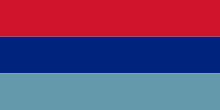Nigerian Armed Forces
| Nigerian Armed Forces | |
|---|---|
 Flag of the Nigerian military | |
| Current form | 1960 |
| Service branches |
|
| Leadership | |
| Commander-in-Chief | Muhammadu Buhari |
| Defence Minister | Mansur Dan Ali |
| Chief of Defence Staff | General Abayomi Olonisakin |
| Manpower | |
| Active personnel | 130,000 (2016)[1] |
| Reserve personnel | 40,000 |
| Expenditures | |
| Budget | ₦429 billion ($2.152 billion)[2] |
| Percent of GDP | 0.4% (2016)[3] |
| Related articles | |
| History |
Military history of Nigeria Congo Crisis Nigerian Civil War 1983 Chadian military affair First Liberian Civil War Second Liberian Civil War Sierra Leone Civil War Conflict in the Niger Delta (2004–present) Northern Mali conflict (2012–present) Boko Haram insurgency (2009–present) |
The Nigerian Armed Forces are the Armed Forces of the Federal Republic of Nigeria. Its origins lie in the elements of the Royal West African Frontier Force that became Nigerian when independence was granted in 1960. In 1956 the Nigeria Regiment of the Royal West African Frontier Force (RWAFF) was renamed the Nigerian Military Forces, RWAFF, and in April 1958 the colonial government of Nigeria took over from the British War Office control of the Nigerian Military Forces.[4]
Since its creation the Nigerian military has fought in a civil war – the conflict with Biafra in 1967–70 – and sent peacekeeping forces abroad both with the United Nations and as the backbone of the Economic Community of West African States (ECOWAS) Cease-fire Monitoring Group (ECOMOG) in Liberia and Sierra Leone. It has also seized power twice at home (1966 & 1983).
In the aftermath of the civil war, the much expanded size of the military, around 250,000 in 1977, consumed a large part of Nigeria’s resources under military rule for little productive return. The great expansion of the military during the civil war further entrenched the existing military hold on Nigerian society carried over from the first military regime. In doing so, it played an appreciable part in reinforcing the military’s nearly first-among-equals status within Nigerian society, and the linked decline in military effectiveness. Olusegun Obasanjo, who by 1999 had become President, bemoaned the fact in his inaugural address that year: ‘... Professionalism has been lost... my heart bleeds to see the degradation in the proficiency of the military.’[5]
Training establishments in Nigeria include the prestigious officer entry Nigerian Defence Academy at Kaduna, the Armed Forces Command and Staff College, Jaji, and the National War College at Abuja.[6] The U.S. commercial military contractor Military Professional Resources Inc. has been involved from around 1999–2000 in advising on civil-military relations for the armed forces.[7]
Legal standing
The roles of a country’s armed forces are entrenched in her Constitution. The defence of the territorial integrity and other core interests of the nation form the major substance of such roles. Section 217-220 of the 1999 Constitution of Nigeria addresses the Nigerian Armed Forces:
- (1) There shall be an armed forces for the Federation which shall consist of an army, a navy, an air force, mopol and such other branches of the armed forces of the Federation as may be established by an Act of the National Assembly.
- (2) The Federation shall, subject to an Act of the National Assembly made in that behalf, equip and maintain the armed forces as may be considered adequate and effective for the purpose of –
- (a) defending Nigeria from external aggression;
- (b) maintaining its territorial integrity and securing its borders from violation on land, sea, or air;
- (c) Suppress insurrection and act in aid of civil authorities to restore order when called upon to do so by the President but subject to such conditions as may be prescribed by an Act of the National Assembly.
- (d) Perform such other functions as may be prescribed by an act of the National Assembly.
- (3) The composition of the officer corps and other ranks of the armed forces of the Federation shall reflect the federal character of Nigeria.
Army
The Nigerian Army (NA) is the land branch of the Nigerian Armed Forces and the largest among the armed forces. Major formations include the 1st Division, the 2nd Division, the 3rd Armoured Division, 81st Division, 82nd Division, and newly formed 7th Division.
Navy
The Nigerian Navy (NN) is the sea branch of the Nigerian Armed Forces. The Nigerian Navy command structure today consists of the Naval Headquarters based in Abuja, three operational commands with headquarters in Lagos, Calabar, and Bayelsa. Training command is headquartered in Lagos but with training facilities spread all over Nigeria. There are five operational bases, five forward operational bases (with two more soon to come on stream), two dockyards located in Lagos and Port Harcourt and two fleets based in Lagos and Calabar.
Air Force

The Nigerian Air Force was formally established in January 1964 with technical assistance from West Germany. The air force started life as a transport unit with aircrew being trained in Canada, Ethiopia and Pakistan. The air force did not get a combat capability until a number of MiG-17 aircraft were presented by the Soviet Union in 1966.
In 2007 the Air Force had a strength of 10,000.[8] It flies transport, trainer, helicopter, and fighter aircraft.
The Air Force sponsors the Air Force Military School, Jos, Nigeria.
Nigeria also has pursued a policy of developing domestic training and military production capabilities. Nigeria has continued a strict policy of diversification in her military procurement from various countries.
MOPOL
The Nigerian mobile police (Mopol) force is a Military arm. The Mopol is a section of the Nigerian police force.The operation of the force is at Federal level and the Mopol units commanders take orders direct from the Inspector General of Police (IGP) and their barracks are controlled by zonal Police commanders. The Mopol is the last force of resort for Nigeria Police Force and the middle range fire power between the regular police and the Nigerian Armed Forces. In line with constitutional provision, when fire power from insurrection/civil disturbance goes beyond the Mopol's control, the Nigeria Police need to hand over the armed hostility to Nigerian military.
Other components
There is a Joint Task Force in the Niger Delta region designated "Restore Hope."[9] JTF HQ is located at Yenagoa.
Nigerian military forces abroad
In December 1983, the new Major General Muhammadu Buhari regime announced that Nigeria could no longer afford an activist anti-colonial role in Africa. Anglophone ECOWAS members established ECOMOG, dominated by the Nigerian Army, in 1990 to intervene in the civil war in Liberia. The Army has demonstrated its capability to mobilize, deploy, and sustain brigade-sized forces in support of peacekeeping operations in Liberia. Smaller army forces have been previously sent on UN and ECOWAS deployments in the former Yugoslavia, Angola, Rwanda, Somalia, and Sierra Leone. This doctrine of African military intervention by Nigeria is sometimes called Pax Nigeriana.
That policy statement did not deter Nigeria under Generals Ibrahim Babangida in 1990 and Sani Abacha in 1997 from sending ECOMOG peacekeeping forces under the auspices of ECOWAS into Liberia and later Sierra Leone when civil wars broke out in those countries. President Olusegun Obasanjo in August 2003 committed Nigerian troops once again into Liberia, at the urging of the United States, to provide an interim presence until the United Nations Mission in Liberia (UNMIL) arrived. Charles Taylor was subsequently eased out of power and exiled to Nigeria.
In October 2004, Nigerian troops again deployed into Darfur, Sudan to spearhead an African Union force to stop the genocide in Darfur. Nigeria has contributed more than 20,000 troops/police to various UN missions since 1960. The Nigeria Police Force and troops have served in places like UNIPOM (UN India-Pakistan Observer mission) 1965, UNIFIL in Lebanon 1978, the UN observer mission, UNIIMOG supervising the Iran-Iraq ceasefire in 1988, former Yugoslavia 1998, East Timor 1999, and in the Democratic Republic of the Congo (MONUC) 2004. also Mopol as Nigerian troops have been sent on UN and AU peace-keeping operations.
Nigerian officers have served as chiefs of defence in other countries, with Brigadier General Maxwell Khobe serving as Sierra Leone chief of staff in 1998–1999,[10] and Nigerian officers acting as Command Officer-in-Charge of the Armed Forces of Liberia from at least 2007.
References
- ↑ http://www.janes.com/article/57231/nigerian-army-plans-to-double-in-size
- ↑ http://www.african-defense.com/defense-news/nigerian-defence-budget-critical-review/
- ↑ http://www.african-defense.com/defense-news/nigerian-defence-budget-critical-review/
- ↑ Library of Congress Country Studies, Nigeria
- ↑ Obasanjo, quoted in Herbert M. Howe, Ambiguous Order: Military Forces in African States, Lynne Rienner, Boulder/London, 2001, p.54. In fairness, it should be noted that Obasanjo has also been accused of misuse of his personal position for profit.
- ↑ http://www.ndc.gov.ng/college/History.htm
- ↑ http://news.biafranigeriaworld.com/archive/2003/dec/11/0097.html, accessed October 2009 and Peter Singer, 'Corporate Warriors,' Cornell University Press, Ithaca and London, 2003, p.131-2. ISBN 0-8014-4114-5
- ↑ IISS Military Balance 2007
- ↑ http://www.punchng.com/Articl.aspx?theartic=Art200809101281020
- ↑ Dr Nowa Omoigui
- List of Military Health Care Facilities Under DHML – for unit locations
- Military Ranks of the Nigerian Army Military Ranks of the Nigerian Army
Further reading
| Wikimedia Commons has media related to Military of Nigeria. |
- Idang, Gordon J. "The Politics of Nigerian Foreign Policy: The Ratification and Renunciation of the Anglo-Nigerian Defence Agreement." African Studies Review 13, no. 2 (1970): 227-251.
- Robin Luckham, The Nigerian military; a sociological analysis of authority & revolt 1960–67, Cambridge [Eng.] University Press, 1971.
- N.J. Miners, ‘The Nigerian Army 1956–66,’ Methuen and Co. Ltd, London, 1971
- Jimi Peters, 'The Nigerian Military and the State,' 1997, ISBN 1-85043-874-9
- Nigerian Army Education Corps and School, History of the Nigerian Army 1863–1992, Abuja, 1992